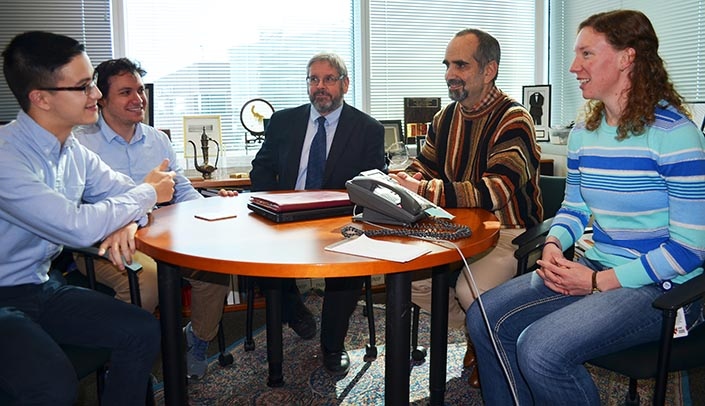Immunology and neuroscience are different. Very different.
But in disease they are inseparably linked in inflammatory, infectious, degenerative and developmental neurological disorders. This includes Parkinson’s and Alzheimer’s, multiple sclerosis and infectious diseases.
“The immune system commonly drives disease and harnessing it can slow or perhaps eliminate signs, symptoms and perhaps even achieve cure,” said Dan Monaghan, Ph.D., professor of pharmacology and experimental neuroscience.
So how can scientists study both? Traditional wisdom is that scientists receive training in one discipline or the other but never both. The two are quite different with varied tools, directions and languages. However, it’s been tough to get experts in both disciplines to talk to each other.
That’s the past and not the present. Everything has changed.
Now the challenge is to produce bilingual scientists with knowledge and tools in both immunology and neuroscience. Enter the UNMC’s new Neuroimmunology of Disease Training Program.
This idea was embraced by the National Institutes of Neurological Disorders and Stroke who recently funded a new training grant. The grant boosts two directors — Drs. Monaghan and Howard Gendelman, M.D., chair of pharmacology and experimental neuroscience. Each of the two received classical training in neuroscience or immunology and now have learned both languages.
The Ph.D. training program, “provides advanced training to better understand how the immune system interacts the nervous system during development, infections and neurodegenerative diseases,” Dr. Gendelman said.
The training program’s emphasis on cross-disciplinary training runs contradictory to the traditional Ph.D. path.
For example, students will have produce one dissertation chapter based upon work done in another laboratory, other than their primary mentors.
“This forces them to think about their problem from different research approaches,” Dr. Monaghan said.
Students also will have opportunities for clinical observations of these neuroimmune interactions in real patients.
“This makes the disease more real to them,” Dr. Monaghan said. “It gives them firsthand experience. The closest many researchers get to an Alzheimer’s patient is a tissue sample.
“But this approach might make them appreciate that these diseases are complex — and get them to think that there might be more clinically-relevant targets.”
Three students are currently enrolled in the inaugural cohort. The NIH grant will pay for four students a year.
This innovative training program will certainly produce a new generation of scientists suited to fight diseases harnessing immunology to combat neural injury. Such multidisciplinary approaches are now also required to better understand complex disease processes and to develop state-of-the-art diagnostic and therapeutic interventions.
